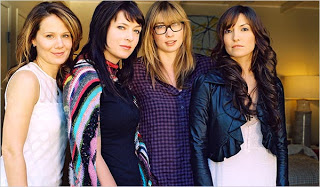Published in the New York Times on Saturday, March 20, “An Entourage of Their Own” by Deborah Schoeneman, highlights the friendship of four women writing in Hollywood today: Dana Fox, who wrote What Happens in Vegas and the screenplay for The Wedding Date; Diablo Cody, who wrote (and won the Oscar for) Juno, the upcoming Jennifer’s Body, and the Showtime series The United States of Tara; Liz Meriwether, who is beginning a screenwriting career after a successful run as a playwright in NYC; and Lorene Scafaria, wrote the screenplay for Nick and Nora’s Infinite Playlist.
Here’s what’s great about the article: In these writers, we have four talented women who give us a positive model of the power of female solidarity, especially in an industry not known for such behavior. In the mode of ‘all publicity is good publicity,’ the article brings attention to women working in Hollywood, and wants to be about how these women navigate life, work, and success in a deeply sexist industry.
Here’s the trouble: “An Entourage of Their Own” appears in the Fashion & Style section.
Why are we reading a fashion article about these women? Especially when there’s very little discussion of fashion or personal style?
Okay, so the four women—who happen to be screenwriters in an industry hostile (at the very least) to powerful women—have a certain kind of style that is more hipster than glam…we guess. Fine. But the way the (female!) writer depicts these women, using the language of submissive sexuality, is atrocious.
Take the opening paragraph:
Cross-legged in one director’s chair was Lorene Scafaria — black pants, brown high heels, amused gaze — leaning in to ask the next question. Waiting to answer, cross-legged in another, was Diablo Cody, struggling to keep her short blue dress from riding up.
This is a style piece (and lifestyle, to be more exact), but why the need to immediately objectify—and sexualize—the women, particularly Cody, with her near-exposure? The first four paragraphs include “cross-legged,” “crossed legs,” “gaze,” “leaning in,” “struggling,” “short blue dress,” “riding up,” “gorgeous,” “naked,” “plunged,” “revealing,” “intimate glimpse,” and “nudity.” At this point, readers are not thinking about fashion or style–much less what they’re interested in writing about–we’re thinking about these women as sexualized objects.
The writer is quick to remind us how hard they work, and how few women can achieve their level of success (!) in Hollywood, and how that success can’t be attributed to their looks, but, just as quickly, she undermines their hard work by quoting men in the biz.
“When you read a screenplay, it doesn’t come with a picture on the cover,” said Adam Siegel, president of Marc Platt Productions, a producer who is friends with all four women and has worked with all except Ms. Cody. “I know a few beautiful women, but none of them write like Dana, Liz, Lorene or Diablo.”
What, exactly, does beauty have to do with writing? If their success cannot be attributed to their good looks, why the incessant need to talk about it? Why is coverage of female filmmakers relegated to the style section of the paper? Finally, if we’re going to have a style piece about the “Fempire,” how about some discussion of their personal style and the way it reflects their confidence, or how it differs from other women who have achieved a similar level of success and power in Hollywood?


This is absolutely enraging.
I saw your comment on the post at Feministing, and I was totally (as in WTF?!?!?!?!) shocked that neither the writer of post, nor the majority of commenters addressed the insane hypocrisy of the NYT article.
Do young women now feel free to simultaneously identify as feminists and devastatingly hot, sexy chicks? I just don’t get it.
The fact that the article never would have been written about four overweight, multi-ethnic women with equal (or far greater) talent seems to have been completely lost on both the NYT and Feministing writers, and most of the commenters.
Thanks for your welcome antidote of sanity!
SR: And the band played on…
LA: Thanks for your comment. I hear you; the language of the article alone negates any good press for the Fempire–who I’m not in love with, but like a good deal.
This is getting lots of interesting discussion on the feminist blogosphere.
http://www.campusprogress.org/opinions/3810/not-a-trend
http://bitchmagazine.org/post/apatow-boys-club-meet-the-fempire
I agree with your complaints about the article. It’s frustrating, but I guess I’m somewhat desensitized because I live in Hollywood, and it just feels like the price to be paid to get an article talking about something really cool – friendship and forming support posses on the road to success.
The quote that leapt out at me, though, was “: “It’s rare to find women who have that balance between work and life, who are really psyched for another woman’s success. I love that about our little group.” Do you think that’s true?
It’s not been my L.A. experience, so I “Flashed my Fempire” today on my blog, and I’m hoping other people will, too.
http://everydaygoddess.typepad.com/everyday_goddess/2009/03/flash-your-fempire.html